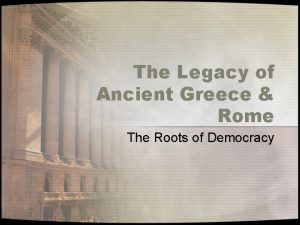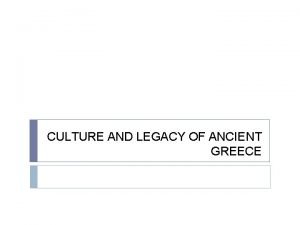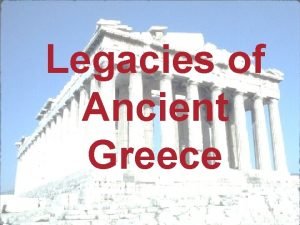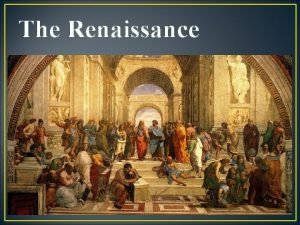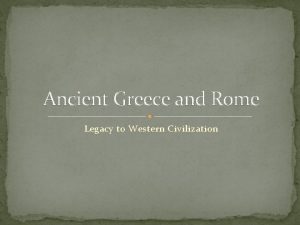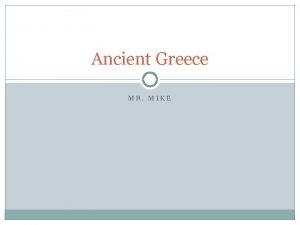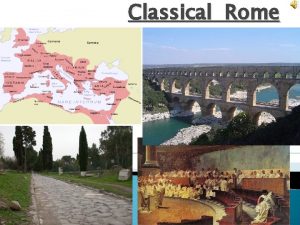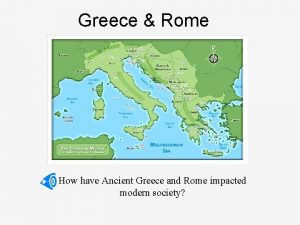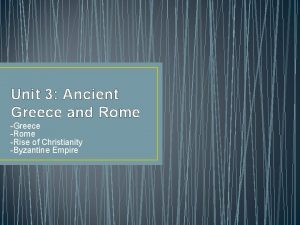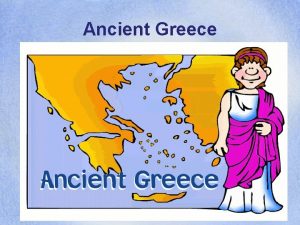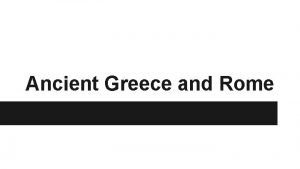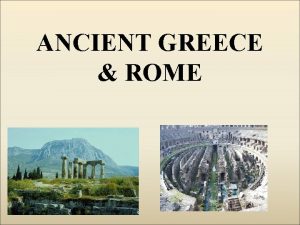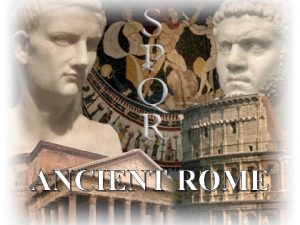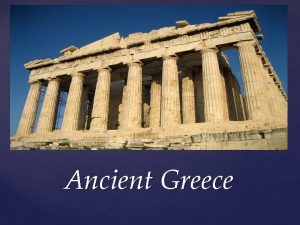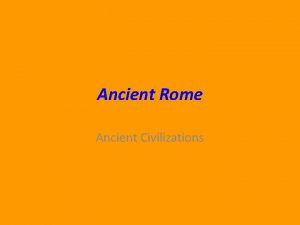The Legacy of Ancient Greece Rome The Roots













- Slides: 13

The Legacy of Ancient Greece & Rome The Roots of Democracy

MAIN IDEA: • The Greeks developed democracy, and the Romans added representative government and a written legal code.

WHY IT MATTERS NOW: • Representation and a written law code are important features of democratic governments around the world.

ANCIENT GREECE Socrates Plato Aristotle

I. ) Athens Builds a Limited Democracy • A. ) At the beginning of its history, Athens is ruled by a king and later was ruled by aristocracy. • B. ) Solon introduces political reforms that gives rights to more people. • C. ) Cleisthenes also works to make Athens more democratic.

II. ) Changes in Greek Democracy • A. ) In the fifth century B. C. , Pericles introduces the idea of direct democracy & paid government officials in Athens. • B. ) Philosophers, including Socrates, Plato, and Aristotle, use logic and reason to explore new ideas, creating an atmosphere helpful to democracy.

• - Socrates: Stressed importance of knowledge; taught by asking questions • - Plato: wrote “The Republic” which stated rule should be by the wisest (“philosopherking”) • - Aristotle: wrote “Politics” which presented his views of government (rule by the middle class )

• C. ) The Greeks develop a number of ideas about institutions for governing that are important in our government today.

III. ) Legacy of Greece • A. ) Stressed the use of logic & reason rather than superstitions or simple traditions. • B. ) Showed that democracy could work. • C. ) Developed the idea of separate branches of government.

ANCIENT ROME

I. ) Rome Develops a Republic • A. ) Around 500 B. C. , Rome develops a republic. • B. ) Expansion creates problems for the Roman republic, with alternating civil wars and rule by dictators, like Julius Caesar. • C. ) Rome ends republic and democracy when Octavian Augustus Caesar becomes emperor and creates the empire in 27 B. C.

II. ) Roman Law • A. ) Rome develops a set of laws that apply equally to people throughout the empire. • B. ) Roman law furthers democratic traditions in Rome and in civilizations that follow.

III. ) Legacy of Rome • A. ) Created the idea of a republic. • B. ) Adopted the Greek idea that an individual is a citizen rather than a subject of the ruler. • C. ) Greatest legacy was its written legal code and the idea that it code be applied equally to all citizens. • D. ) They preserved, added to, and passed to the future the Greek idea of democracy.
 The legacy of ancient greece and rome
The legacy of ancient greece and rome The legacy of ancient greece chapter 31
The legacy of ancient greece chapter 31 Culture and legacy of ancient greece stations
Culture and legacy of ancient greece stations The legacy of ancient greece
The legacy of ancient greece The legacy of ancient greece chapter 31 answers
The legacy of ancient greece chapter 31 answers Explain the physical education in sparta
Explain the physical education in sparta The term renaissance literally means
The term renaissance literally means Babylon medo-persia greece rome timeline
Babylon medo-persia greece rome timeline What is a myth
What is a myth The glory that was greece
The glory that was greece Roman contributions to western civilization
Roman contributions to western civilization Rome and the roots of western civilization
Rome and the roots of western civilization Perfect cubes list
Perfect cubes list Square roots notes
Square roots notes
